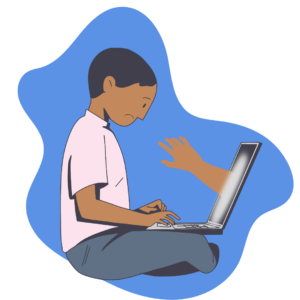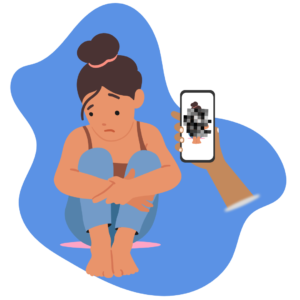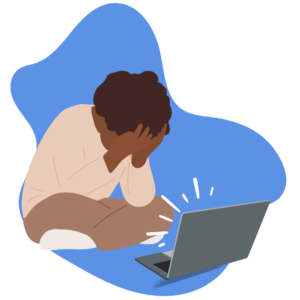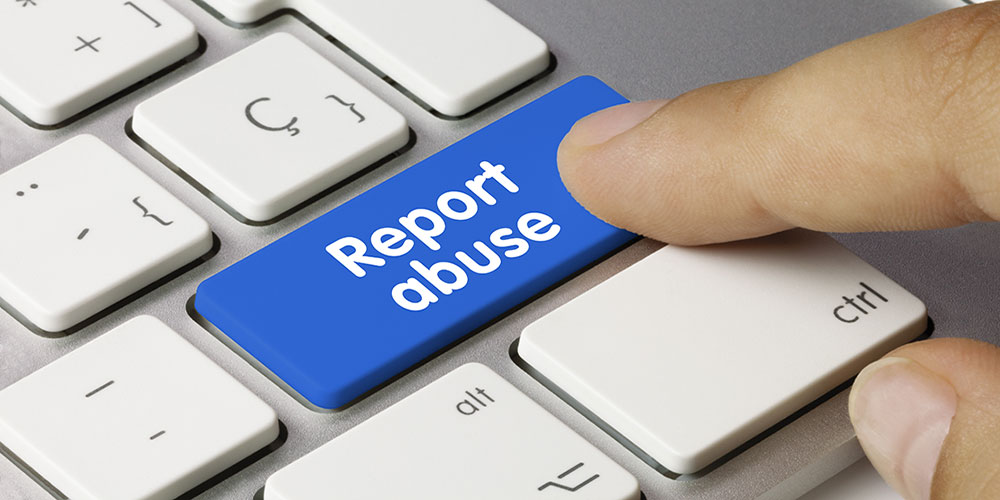What is the Safer Children Online Campaign?
In many African communities, there is limited awareness and understanding of the risks associated with online activities. Parents and guardians may not be adequately informed about the potential dangers their children face when using the internet, making children more susceptible to exploitation.
The Safer Children campaign hopes to close this gap and encourage the reporting of child sexual abuse material (CSAM) in Ghana by raising awareness of parents, guardians, teachers and children on the prevalence of Online Child Sexual Abuse and how they report such content.
2021 – 2022 NCMEC CyberTipline report on the sharing and distributon of CSAM in Ghana
19,733
reports received from Ghana in 2021
21,909
reports received from Ghana in 2022
NCMEC (National Center for Missing and Exploited Children) is an American agency that receives regular reports called “Cybertips” on child sexual abuse material that is shared and distributed online. NCMEC publishes every year an annual report on the number and countries of origin of these Cybertips.
What is online child sexual exploitation and abuse?
Online child sexual exploitation and abuse involves the use of information and communication technology as a means to sexually abuse and/or sexually exploit children. Although the exploitation of children is not a new phenomenon, digitalization has exacerbated the problem and created more vulnerability to children. In Africa especially, online child sexual exploitation and abuse is a growing concern that is often overlooked. Children can fall victim to online child sexual exploitation and abuse on any platform online as it sometimes begins in a simple way – a hello message on Facebook, a stranger liking your child’s picture on Instagram, or someone they don’t know in person begins complimenting them online.
Online child sexual exploitation and abuse can include the following activities:
To learn more about the different types of online child sexual exploitation and abuse please click here.

Online grooming – which can be described as a situation where an adult ‘befriends’ a child (often online) with the intention of sexually abusing her/him.

Child sexual abuse material – which is the representation, by whatever means, of a child engaged in real or simulated explicit sexual activities or representation of the sexual parts of a child for primarily sexual purposes.

Live streaming of child sexual abuse – which involves the real-time broadcasting of child sexual abuse to viewers. It can happen on online chat rooms, social media platforms, or communication apps.
When you make a report, you give the child victim the chance to have the child sexual abuse material of themselves removed or taken down from the internet!

How to report online child sexual exploitation and abuse material
Seeing images of child sexual abuse material online can be scary because we can never stop wondering – what if that was my child, my sister, my brother, my nephew, my niece, my neighbour? A child is to be protected and not exploited and you can do something about it. You can report any content, image or video you come across online of a child being sexually exploited or abused. When you report these images or videos, they can be detected and removed. Contribute to create a space for safer children online!
How can you protect your children from online child sexual exploitation and abuse?
Protecting children from online child exploitation and abuse should be of utmost importance to everyone in today’s digital age. Here are some essential steps that parents, guardians and children can take to stay safe online.
Remember, online safety is an ongoing conversation and process. By staying involved and proactive, you as a parent, guardian, teacher or student, can play a crucial role in protecting children from online exploitation and abuse and ensuring Safer Children Online.
Education:
Educate your children about the potential dangers of the internet, including online predators and inappropriate content. Teach them how to recognize and avoid risky situations and advise your children to only connect and interact online with people they know and trust in real life. You can visit our Youtube channel for simple and effective videos parents can use to educate their children on online safety.
Communication:
Establish open and honest communication with your children about internet safety. Encourage them to talk to you if they encounter anything uncomfortable or suspicious online.
Set boundaries and guidelines:
Set clear rules and guidelines for internet use. Discuss the websites and platforms your children are allowed to access, appropriate screen time limits, and the importance of not sharing personal information online. For younger children, ensure they use the internet in a supervised environment, such as in a family room or common area.
Monitor online activities:
Keep an eye on your children’s online activities. You can use parental control software and monitor their social media accounts to ensure they are not engaging with harmful content or interacting with strangers.
Encourage reporting:
Teach your children to report any suspicious or inappropriate behavior they encounter online, whether it’s from peers, strangers, or adults.
Report abuse:
If you encounter any online content that involves child exploitation or abuse, immediately report it to the appropriate authorities or the platform where you found it.
Stay informed:
Stay up-to-date on the latest online threats and risks related to children. Being informed will help you adapt your approach and educate your children accordingly.
Thanks to the Cybersecurity Authority of Ghana, you can also use these other avenues to report CSAM in Ghana

Follow Us
UNODC – Regional Office for West And Central Africa – Global Programme on Cybercrime
Almadies Ngor Extension, Zone 10 – P.O Box 455 – Dakar Senegal unodc.cybercrimeteam@un.org
